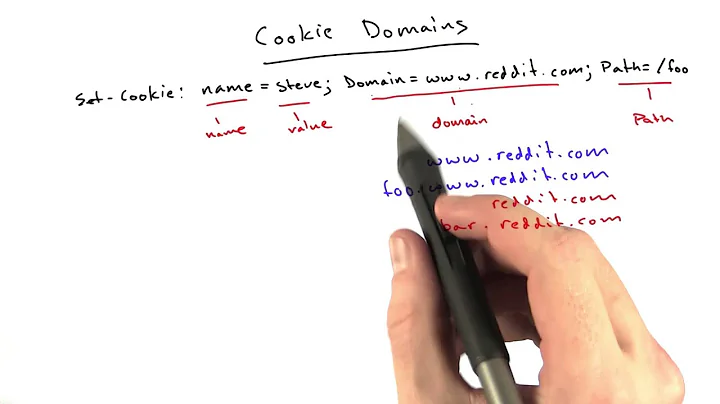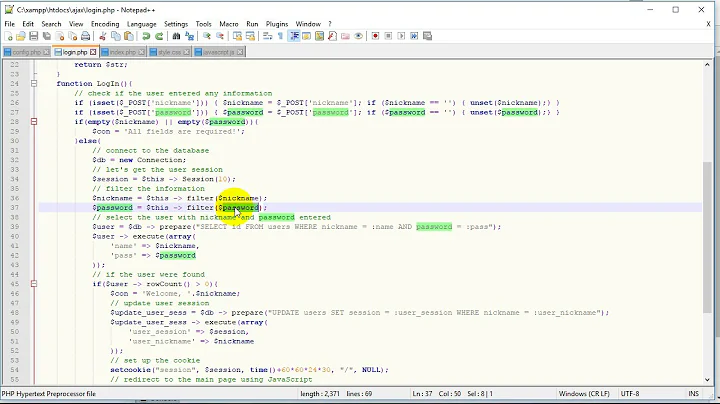Setting a cookie on a subdomain from an ajax request
Solution 1
Set the allow Credentials header on api
Access-Control-Allow-Credentials: true
Use withCredentials for the request
$.ajax({
url: a_cross_domain_url,
xhrFields: {
withCredentials: true
}
});
Otherwise the XMLHttpRequest will not send the cookies, regardless of the Access-Control-Allow-Credentials header.
Remove the wildcard on Access-Control-Allow-Origin
Access-Control-Allow-Origin: http://www.example.com
The wildcard * will not work. The browser will discard the response if withCredentials was set.
References:
http://hacks.mozilla.org/2009/07/cross-site-xmlhttprequest-with-cors/
https://developer.mozilla.org/en-US/docs/HTTP_access_control
http://arunranga.com/examples/access-control/credentialedRequest.html
http://api.jquery.com/jQuery.ajax/
Solution 2
I added this post later as I ran into problems with my previous solution when I needed to pass cookies from multiple subdomains to a single API domain using AJAX and PHP
This was the challenge and solution:
1 - Backend PHP on api.example.com.
2 - Multiple JS front ends such as one.example.com, two.example.com etc.
3 - Cookies needed to be passed both ways.
4 - AJAX call from multiple front-ends to PHP backend on api.example.com
5 - In PHP, I do not prefer to use $_SERVER["HTTP_ORIGIN"], not always reliable/safe in my opinion (I had some browsers where HTTP-ORIGIN was always empty).
The normal way to do this in PHP with single front end domain is starting PHP code with:
header('Access-Control-Allow-Origin: https://one.example.com');
header('Access-Control-Allow-Headers: Origin, Content-Type, X-Auth-Token');
header('Access-Control-Allow-Credentials: true');
And in JS on one.example.com domain:
jQuery.ajax({
url: myURL,
type: "POST",
xhrFields: {withCredentials: true},
dataType: "text",
contentType: "text/xml; charset=\"utf-8\"",
cache: false,
headers: "",
data: myCallJSONStr,
success: function(myResponse) {.....}
However, this is not workable as I am using multiple subdomains to call my API domain.
And this solution will NOT work as I want to pass on cookies:
header('Access-Control-Allow-Origin: *');
It conflicts with the pass on cookie setting on the JS site:
xhrFields: {withCredentials: true}
Here is what I did:
1 - use GET parameter to pass the Subdomain.
2 - Hardcode the Main domain in PHP so only (all) Subdomains are allowed.
This is the JS/JQuery AJAX part of my solution:
function getSubDomain(){
let mySubDomain = "";
let myDomain = window.location.host;
let myArrayParts = myDomain.split(".");
if (myArrayParts.length == 3){
mySubDomain = myArrayParts[0];
}
return mySubDomain;
}
And in the AJAX call:
let mySubDomain = getSubDomain();
if (mySubDomain != ""){
myURL += "?source=" + mySubDomain + "&end"; //use & instead of ? if URL already has GET parameters
}
jQuery.ajax({
url: myURL,
type: "POST",
xhrFields: {withCredentials: true},
dataType: "text",
contentType: "text/xml; charset=\"utf-8\"",
cache: false,
headers: "",
data: myCallJSONStr,
success: function(myResponse) {.....}
Finally, the PHP part:
<?php
$myDomain = "example.com";
$mySubdomain = "";
if (isset($_GET["source"])) {
$mySubdomain = $_GET["source"].".";
}
$myDomainAllowOrigin = "https://".$mySubdomain.$myDomain;
$myAllowOrigin = "Access-Control-Allow-Origin: ".$myDomainAllowOrigin;
//echo $myAllowOrigin;
header($myAllowOrigin);
header('Access-Control-Allow-Headers: Origin, Content-Type, X-Auth-Token');
header('Access-Control-Allow-Credentials: true');
IMPORTANT, don't forget to set the cookies for all subdomains, in this case the domain for the cookie would be: .example.com (so with a dot in front of the main domain):
<?php
//////////////// GLOBALS /////////////////////////////////
$gCookieDomain = ".example.com";
$gCookieValidForDays = 90;
//////////////// COOKIE FUNTIONS /////////////////////////////////
function setAPCookie($myCookieName, $myCookieValue, $myHttponly){
global $gCookieDomain;
global $gCookieValidForDays;
$myExpires = time()+60*60*24*$gCookieValidForDays;
setcookie($myCookieName, $myCookieValue, $myExpires, "/", $gCookieDomain, true, $myHttponly);
return $myExpires;
}
This solution allows me to call the API on api.example.com from any subdomains on example.com.
NB. for situation where there is only a single calling subdomain, I prefer using .htaccess for setting CORS instead of PHP. Here is an example of .htaccess (linux/apache) for only one.example.com calling api.example.com:
<IfModule mod_headers.c>
Header set Access-Control-Allow-Origin "https://one.example.com"
Header set Access-Control-Allow-Headers "Origin, Content-Type, X-Auth-Token"
Header set Access-Control-Allow-Credentials "true"
</IfModule>
And place this .htaccess in the root of api.example.com.
Solution 3
In addition to the correct answer of Alexandre, this is my working CORS setting via .htaccess.
Added to .htaccess file on api.example.com in the directory with the phps (or above):
<IfModule mod_headers.c>
Header set Access-Control-Allow-Origin "https://www.example.com"
Header set Access-Control-Allow-Headers "Origin, Content-Type, X-Auth-Token"
Header set Access-Control-Allow-Credentials "true"
</IfModule>
And on www.example.com, I added to my AJAX call xhrFields: {withCredentials: true}. Here are all the settings:
jQuery.ajax({
url: myURL,
type: "POST",
xhrFields: {withCredentials: true},
dataType: "text",
contentType: "text/xml; charset=\"utf-8\"",
cache: false,
headers: "",
data: myCallJSONStr,
success: function(myResponse) { etc....
Where URL makes a call to a php on api.example.com.
Please note that Alexandre is right, you must specify an exact subdomain, any wildcards unfortunately will not work. So this will NOT work:
Header set Access-Control-Allow-Origin "*"
This setting will be blocked by CORS when using the Access-Control-Allow-Credentials "true" setting.
Related videos on Youtube
Alexandre
Updated on September 15, 2022Comments
-
 Alexandre over 1 year
Alexandre over 1 yearI have a webapp on www.example.com and an API on api.example.com.
The webapp makes ajax calls to the API.
Somewhere I need to put a cookie on api.example.com to keep sessions track.
To track my problem I've set test cookies on both subdomaines from the webapp and the api. The webapp set a cookie on .exemple.com and the api set one on .exemple.com and another on api.exemple.com. Cookies are set using Domain=.exemple.com only. No path, no HTTPOnly.
Note: In the end I need only one on api.exemple.com. But theses are for the tests.
Direct queries using my browser (Firefox 16) works fine. Query on api: the two cookies are set and sent. Query on www: the cookie is set and the two from the api is sent too. (Provided I query www after the api, of course).
Now, I clean the browser cookies and query www only. Query on www: works fine, same as before. Subquery on api, from www's ajax request: no cookies are sent. Set-Cookies does nothing. Using Firebug I see the cookies in the response. But no traces of them on subsequent requests or the page informations.
I event tried to enable the cookies log on Firefox. Absolutly no traces of the cookies from api, not even a reject notice.
In the end I only need a way to store one cookie on api. And for that, I quite open :)
Informations: The two servers are NodeJS. I've tried to set the cookie on the server side (Set-Cookie header), on the client side (document.cookies), manually using firebug.
Others posts I've checked with no solutions (And many others which I don't recall):
setting cross-subdomain cookie with javascript
Can subdomain.example.com set a cookie that can be read by example.com?






